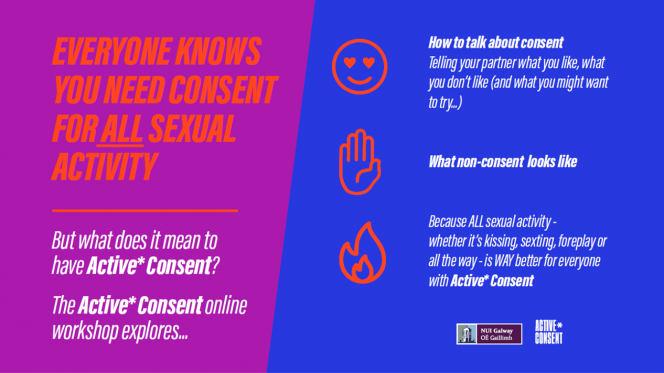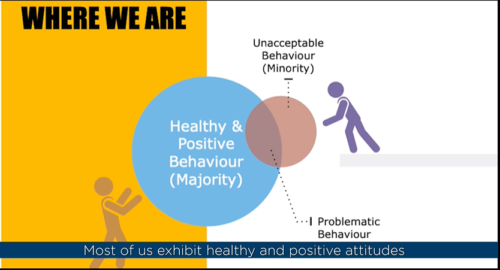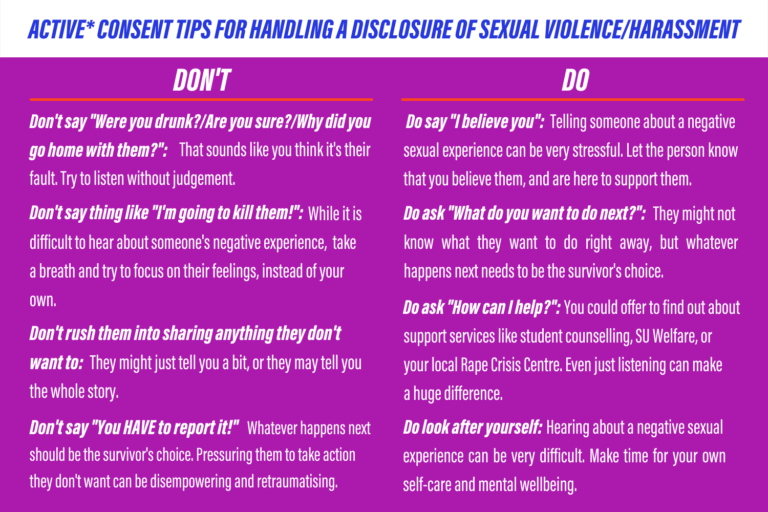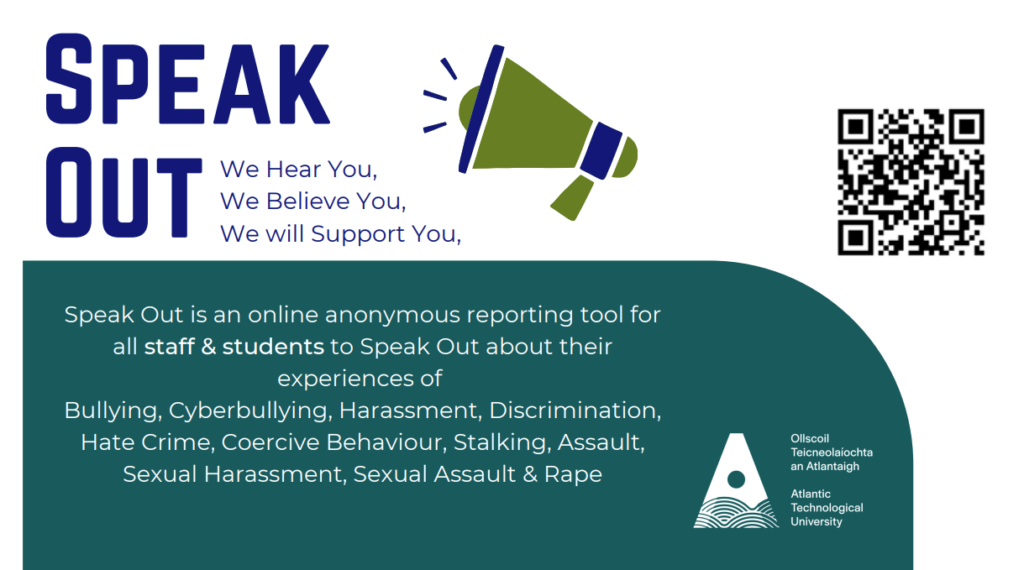Home » Student Portal » Consent
Consent
College life is a brand-new experience, from meeting new people, socialising and even new relationships. New relationships are very often exciting especially when both partners are on the same page and want the same thing.
At the same time, they can be confusing, especially when it comes to sex and consent. Sex is a whole new journey for many people starting college.
It can often be hard to know what the other person wants when it comes to sex, especially in new relationships.
Some people may want to take it slow when it comes to intimacy, and it’s not easy to know where you stand with this all of the time because we are not mind readers. That is why it’s important to have a conversation.
Whether you are ‘hooking up’, or in a long-term relationship, it’s important to obtain the other persons permission, which means their consent.
Go to:
What is Consent
Sexual consent is OMFG – Ongoing, Mutual and Freely Given.
Sexual consent is the voluntary agreement between both partners with equal power to engage in any sexual activity.
This agreement can be verbal or non-verbal but should be given freely by individuals capable of consenting, that is, who are over the legal age of consent and not under the influence of alcohol or drugs.
Consent should never be assumed – it should be a clear, ongoing and continuous process present in every new or repeated sexual encounter.
You need consent for ALL sexual activity.
How does Consent work
Many people worry that talking about consent will be awkward or a mood-killer, but this is not the case. If anything, when both of you can freely communicate what you do or do not want, it can create a more enjoyable experience.
Consent is the presence of an enthusiastic ‘yes’,
not just the absence of a ‘no’.

BEFORE
Chat about the kind of things that you are into, for example by saying: Tell me what you like? Talk about what terms like “hooking up” or “going further” mean to each of you.

DURING
Communications and consent can even become part of your foreplay, for example by saying things like: Are you comfortable? Is this ok? Does this feel good? Do you want to stop? Do you want to go further with this?

LISTEN & RESPOND
Pay attention if the person’s body language changes. Ask them if they want to continue and listen to their answers and always remember that consent is about more than avoiding abuse – it is having sex safer, healthier, and more pleasurable for everyone involved.
How to know if someone is not freely consenting

If someone is not responding enthusiastically or clearly, they may be feeling coerced.
Check-in with them and if they seem happy not to continue STOP.
If someone is struggling or expressing any sort of discomfort (verbally or non-verbally), notice and STOP.
If the other person seems frozen or afraid, STOP.
If someone is asleep or falling asleep, STOP.
If someone is under the effects of drugs or alcohol and can no longer indicate their enjoyment and/or willingness, STOP.
If he or she is acting in any other way that suggests they are not up for sex, check it out and be prepared to STOP.
Some key facts to keep in mind
The legal age of consent in Ireland is 17 for people of every sexual orientation and gender.
Engaging in sexual activity of any kind without consent is extremely harmful to the person you are assaulting and is a criminal act.
Read the Criminal Law (Sexual Offences) Act, 2017 on consent and a range of other sexual offences HERE.

Intimate Images
Consent applies to the sharing of intimate images. It is needed for sexting, sending sexual material online, or making sexual comments or propositions.
The Harassment, Harmful Communications and Related Offences Act 2020, also known as “Coco’s Law, created two new offences which criminalise the non-consensual distribution of intimate images and the taking, distribution or publication of intimate images without consent even if there is no specific intent to cause harm.
Watch the video about sharing intimate content online, or when considering sending a sext.
Image Based Sexual Abuse
Active* Consent Workshop
Active* Consent programmes are developed in NUIG by the Active* Consent team and involve various types of workshops and training.
The Active* Consent workshop gives students engaging and up-to-date information and skills that are practical and relevant for their own relationships. To find out more please email Grace McGee, the Mental Health & Wellbeing Project Officer at mcgee.grace@nullitsligo.ie.
“The Active* Consent programme supports young people like you to have positive and confident sexual health and wellbeing. We are a collaboration between Psychology and Drama and Theatre Studies at NUI Galway. We like to use creative ways like interactive workshops, theatre, social media and online learning to equip young people like you with the tools to recognise and communicate about sexual consent.
Our workshops provide safe spaces to explore the nuances of sexual consent and how best to negotiate active sexual consent with your peers and within your own intimate relationships. We also carry out research with young adults to understand your needs and to further develop our resources and interventions. We stress that there is no active participation required from students. The only time you will be asked an opinion, is to vote electronically on two statements and to evaluate the workshop, both anonymously via slido.com. ”
Active Consent
Consent Hub
Active* Consent launched The Consent Hub website, in partnership with the Department of Justice and the Department of Further and Higher Education, Research, Innovation and Science. This learning hub is the first national and publicly available online resource for sexual consent education and awareness in Ireland.
The hub includes answers to frequently asked questions and clear explanations of consent, sexual violence and harassment; an eLearning module for students; information on where to get help if a negative sexual experiences occurs; information on trainings; and more.

Active* Consent eLearning Module - Sexual Violence and Harassment: How to Support Yourself and Your Peers
NUI Galway’s Active* Consent eLearning module, Sexual Violence and Harassment: How to Support Yourself and Your Peers, builds on topics explored in the Active* Consent online workshop to introduce a more nuanced understanding of sexual violence, harassment and support services available to students who have had negative sexual experiences.
This module is directly informed by data from the Active* Consent and USI 2020 Sexual Experiences Survey, which showed gaps in students’ understanding of consent that need to be addressed.
During the module ‘users’ immediately test their new knowledge by applying it to fictionalized consent scenarios featuring a diverse range of relationships. ‘Users’ are also asked to compare their own assumptions of students experiences of sexual violence and/or harassment (SVH) with current national statistics from the SES survey through the quizzes and polls.
How long will it take?
Approximately 30-45 minutes to complete. This includes the time taken to watch a variety of informative and engaging videos on topics like the legal definition of consent, and how gender roles can impact how we communicate consent with our partners.
This module explores themes of sexual violence and harassment. You can choose not to participate in this module. If any participants are affected by the contents of this module, please reach out to the following support services.
Access the Module
Bystander Intervention
The Bystander Intervention team at UCC has developed a new 15 minute “quick guide” to being an effective bystander.

Bystander Intervention: Survivor Story 1
Bystander Intervention: Survivor Story 2
'Start Here' Campaign
What would you do if a friend told you about a negative sexual experience? Don’t know what to do? Start here.
Developed by NUIG Active Consent, USI and Galway Rape Crisis Centre.

Sexual Consent Videos
Consent is about asking and listening to the answer
How do you know if someone wants to have sex with you?
Tea Consent
Framework for Consent
ATU Sligo is committed to the development of an institutional campus culture which is safe, respectful and supportive. We are actively working to implement the Framework for Consent in HEIs: Safe, Respectful, Supportive and Positive: Ending Sexual Harassment in Irish Higher Education Institutions, and the THEA PROPEL Report; Promoting Consent and Preventing Sexual Violence for Higher Education Institutions.
Speak Out
Speak Out is an online and anonymous reporting tool available for students and staff to disclose past or ongoing incidents of bullying, cyberbullying, harassment, discrimination, hate crime, coercive behaviour/control, stalking, assault, sexual harassment, sexual assault, and rape.
The information you provide using this tool is valuable as the data collated will help inform ATU Sligo activities aimed at addressing bullying, harassment and sexual misconduct.
It is important to remember that as the Speak Out reporting tool is completely anonymous, there is no way of identifying or contacting any member of the university community who uses the tool. Ongoing or past incidences witnessed or experienced can be reported.
The tool will help you to find information and contact details of relevant ATU Sligo supports and specialist external supports
Please report one incident, or a series of related incidents at a time. This is to ensure that we can understand the nature of your experience.

Support Services
Support Services
ATU Sligo Student Health Service
Tel: 071-9305205
071-9305463
E: studenthealthservices.sligo@nullatu.ie
Web: Health Services
ATU Sligo Counselling Service
E: studentcounsellingservices.sligo@nullatu.ie
Web: Counselling
ATU Sligo Students Union
Tel: 07 1 91 41887
Sligo Rape Crisis Centre – covering Sligo, Leitrim and Cavan Tel: 1800 750 780 – Web: https://www.srcc.ie/
Donegal Sexual Assault Treatment Unit (SATU) –Tel: 087 0681964 (24 hour)
Donegal Sexual Abuse and Rape Crisis Centre – Tel: 1800 44 88 44/ 074-9128211 (Mon to Fri – 9am to 5pm) Web: www.donegalrapecrisis.ie
Domestic Violence Advocacy Service (DVAS) Sligo, Leitrim and West Cavan Tel: 071 914 1515
Sligo Garda Station Tel: 071 91 57000
Rape Crisis Centre – National 24-Hour Helpline 1800 77 8888
A free and confidential listening and support service for anyone who has been raped, sexually assaulted, sexually harassed or sexually abused at any time in their lives.
TEXT Crisis Textline Ireland: Free-text ATU to 50808
A free, anonymous, 24/7 messaging service providing everything from a calming chat to immediate support.
The Samaritans: 116 123
Provides emotional support, to anyone in distress or struggling to cope.
Pieta House: 1800 247 247 or Text HELP to 51444
Provides a free therapeutic approach to people who are experiencing suicidal ideation, engaging in self-harm, or have been bereaved by suicide.
ATU Sligo is committed to the promotion of positive sexual experiences and there will be opportunities and campaigns during the academic year for you to learn more about Active* Consent and positive sexual health and wellbeing. See more on our website. Information is taken from; the Rape Crisis Centre, SPUNOUT.